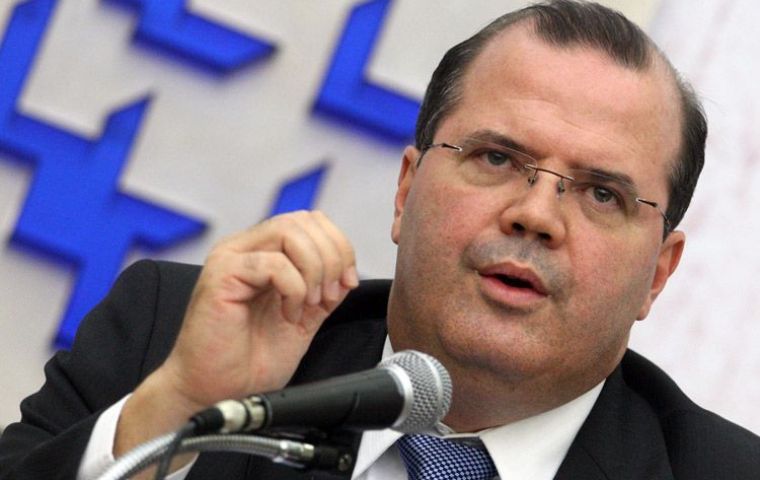MercoPress. South Atlantic News Agency
Brazil lowers benchmark rate for eighth straight time to 8%
 Tombini has cut lending costs by 4.5 percentage points since last August
Tombini has cut lending costs by 4.5 percentage points since last August Brazil’s central bank cut its benchmark interest rate for the eighth straight time and signaled it will continue to lower borrowing costs, as spillover from a global economic slowdown limits inflation risks.
Central bank board members voted unanimously on Wednesday to cut the Selic rate by a half-point to a record 8%. In a statement almost identical to ones issued at their two previous meetings, policy makers said “fragility” abroad is having a “dis-inflationary” impact in the world’s second-biggest emerging market. (*)
Board members led by bank President Alexandre Tombini have lowered borrowing costs by 4.5 percentage points since August to revive an economy that expanded an annualized 0.8% in the first quarter, less than half the pace of the US The monetary stimulus, combined with tax cuts and increased lending by state banks, have so far failed to spur faster growth as indebted consumers facing a tougher job market cut back on spending.
Brazil’s economy will grow 2.01% this year, its second-worst performance since 2003, according to a central bank survey of economists published this week.
President Dilma Rousseff’s government received more bad economic news this week after the national statistics agency reported that retail sales fell 0.8% in May, the most in more than three years. The broader index, which includes the sale of vehicles benefiting from tax breaks, fell 0.7%.
While inflation in Latin America’s biggest economy is slowing, dipping below 5% in May for the first time in 20 months, investor confidence is being shaken by signs that Brazil’s credit-led growth model has run its course after helping lift 40 million people out of poverty since 2003.
The consumer default rate in May rose to 8%, a 30- month high, while the share of household income used to service debt stands at 22%, double the level in the US.
A strong labor market, which has underpinned growth over the past decade, also seems to be faltering. While unemployment in May was at a record low for the month of 5.8%, the economy generated 45% fewer jobs than a year ago.
Industry has been the hardest hit, as slumping global demand offset potential gains from a weaker currency that makes Brazilian goods cheaper. Manufacturing payrolls fell 1.7% in May from a year ago, the eighth straight such decline and the worst performance since December 2009.
Volvo AB became the latest company to announce layoffs, saying on July 4 that it was cutting 208 jobs at its truck plant in Curitiba, Brazil. General Motors and Daimler AG’s Mercedes- Benz are also seeking to slow output at their Brazilian assembly lines.
However even after Wednesday’s rate cut Brazil still has the third- highest real interest rate among the Group of 20 nations, after Russia and China, meaning policy makers have more firepower to fight the effects of Europe’s debt crisis and a slowdown in China, its biggest trading partner.
The slower-than-expected recovery should allow policy makers to maintain the pace of interest rate reductions at half-point intervals, a government official familiar with the bank’s deliberations said last week on the condition of anonymity.
In the short-term, weak growth is helping to contain inflation risks even amid a world-beating slide in the currency that could increase the cost of imports. The real has lost 10.3% against the US dollar over the past three months.
(*) “The Copom considers that, at this moment, the risks for the inflation path remain limited. The Committee also notes that, up to now, given the fragility of the global economy, the contribution of the external sector has been dis-inflationary.
Therefore, continuing the adjustment process of monetary conditions, the Copom decided to reduce the Selic rate to 8.0 percent p.a., without bias.
Voting in favor of the reduction in the Selic rate to 8.0 percent are the following board members: President Alexandre Antonio Tombini, Aldo Luiz Mendes, Altamir Lopes, Anthero de Moraes Meirelles, Carlos Hamilton Vasconcelos Araujo, Luiz Awazu Pereira da Silva, Luiz Edson Feltrim and Sidnei Correa Marques.”




Top Comments
Disclaimer & comment rulesCommenting for this story is now closed.
If you have a Facebook account, become a fan and comment on our Facebook Page!